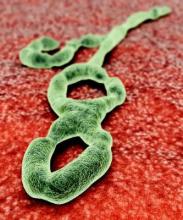Ebola virus disease (EVD) survivors often complained of headache, musculoskeletal pain, and ocular symptoms during the weeks after they tested negative for the virus, according to an analysis of patients cared for at an Ebola treatment unit in Freetown, Sierra Leone.
The study participants included 44 EVD patients who were discharged from the treatment unit during December 2014 to March 2015 after testing negative for Ebola virus on separate days, in two consecutive negative polymerase chain reaction assessments. All 44 patients had attended at least two follow-up appointments at the treatment unit within 2 weeks of discharge, when the researchers conducted their analysis.
All survivors made at least one complaint about their health after discharge, with the median number of health issues and maximum number of health issues reported having been two and five, respectively. Of the 117 complaints reported by the patients, 31 were for musculoskeletal pain, 21 were for headaches, and 6 were for ocular problems, including eye pain, clear discharge, red eyes, and blurred vision.
While there were no significant differences in viral load at admission to the Ebola treatment unit between those patients who had ocular problems or musculoskeletal pain and those who did not, patients who reported headache had a significantly higher viral load at admission than those who did not report a headache.
Of the 44 EVD patients who had been discharged from the unit, one had died as of March 8, 2015. That patient’s death occurred 1 month after his recovery from acute EVD and was preceded by deteriorating respiratory symptoms and left-sided pleural effusion.
Dr. Janet T. Scott, a clinical lecturer in pharmacology and infectious disease at the Institute of Translational Medicine at the University of Liverpool (England), and her colleagues recommended future studies of Ebola survivors follow patients for a longer period of time than the first 2 weeks after discharge from an Ebola treatment center.
“Because some complications occur weeks or months after acute onset of EVD, some symptoms might be underestimated in this cohort,” the researchers said.
Read the study in Emerging Infectious Diseases (doi: 10.3201/eid2204.151302).


